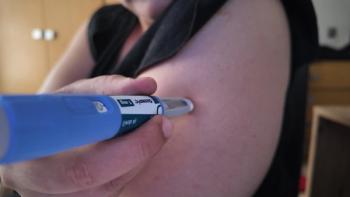
Ongoing TRANSCEND Trial May Offer Hope to MCL Subset
The treatment landscape for mantle cell lymphoma (MCL) is rapidly evolving, though patients with relapsed/refractory disease tend to still have poorer outcomes than others; however, hope may be on the horizon, according to Luhua (Michael) Wang, MD.
The treatment landscape for mantle cell lymphoma (MCL) is rapidly evolving, though patients with relapsed/refractory disease tend to still have poorer outcomes than others; however, hope may be on the horizon, according to Luhua (Michael) Wang, MD.
At the 2019 ASCO Annual Meeting, Oncology Nursing News sat down with Wang, who is a professor in the Department of Lymphoma and Myeloma at The University of Texas MD Anderson Cancer Center, and an investigator on the ongoing phase I TRANSCEND trial, which is examining the safety and preliminary efficacy of lisocabtagene maraleucel (Liso-cel) in patients with relapsed/refractory MCL, and what the future holds in this field.
Oncology Nursing News: Can you briefly describe recent advances made in MCL?
Wang: Mantle cell lymphoma research is one of the most rapidly progressing fields in the field of hematology and oncology. There is fast progress in several areas. Number one, targeted therapies are booming with agents like ibrutinib (Imbruvica), acalabrutinib (Calquence), and many other exciting agents. Also, there are combinations of these agents with even more efficacy improvements to be seen.
We also found out that high-risk patients with mantle cell lymphoma could not be put in remission for a prolonged period of time with targeted therapies combined with chemotherapy. The high-risk patients with mantle cell lymphoma always relapse, and therefore, the current cell therapy is the major advance in mantle cell lymphoma.
Can you expand on the challenges associated with relapse in these patients, and what is being done to address these challenges?
Especially when [patients facing relapse] have high-risk features, including high Ki-67, blastoid karyotype, TP53 mutation, CMYK mutation, or a complex karyotype, [they] could not be cured with what we have with chemotherapy, transplant, radiation, or targeted therapies. Therefore, we have to confront this with cell therapies.
So far, there are many [cell therapy] clinical trials ongoing. Two of the multicenter trials are focused on mantle cell lymphoma.
Can you provide some background on the TRANSCEND trial?
Every day in the clinic, we are facing patients who relapse after chemotherapy in combination with targeted therapies, so we started to use cell therapies. The phase-finding part of the trial has been proven to be efficacious with a pretty good safety profile. Therefore, we have expanded into a cohort of 28 patients.
What are some questions that still need to be answered?
We know that cell therapies against CD19 very likely could put a fraction of patients into long-term remission. However, the majority would still relapse, so we need to find ways to overcome the CAR T-cell resistance. The CAR T-cell resistance could (occur) number one because the loss of antigen, as we learned from other B-cell lymphomas with a CAR T cell, and also because the CD19 target is not lost and the parallel pathways are overly activated. Therefore, we need to find ways to overcome the resistance. If the target is lost, we need to find new targets. We could also attack two targets at the same time. So, for example, we can attack CD19 with CD22 together so that we can overcome some of the resistance.
We can find a new target to attack and there are so many new targets we can do. We could rely on CAR T-cell therapy strategy, (which) we are not totally dependent on. We are fast approaching the precision medicine era. We could use DNA, RNA epigenetic mutation, and, with the discrete mechanism of resistance of each patient, use what we can according to aim to target these pathways so we can overcome resistance in the personalized therapy for each patient. This is what is coming in the future of the cell therapy era.
Are there any ongoing trials looking at this?
I am happy to report that I am the co-principal investigator of the mantle cell lymphoma Moonshot at The University of Texas MD Anderson Cancer Center. We have three flagships. The first is using next-generation precision medicines. The second is the cell therapies. And then we have adopted cell therapies where we are looking for new targets like CD79 and others. So, coming back to the next generation precision medicine trial, it is an umbrella of the Moonshot. We have designed 2 personalized therapies — one is called the EXPLORE trial using the in vitro screening for the best combinations and the other trial is a B-cell lymphoma match trial.
Newsletter
Knowledge is power. Don’t miss the most recent breakthroughs in cancer care.

































